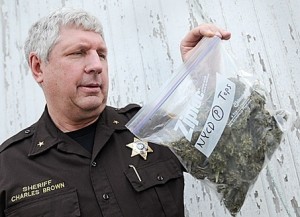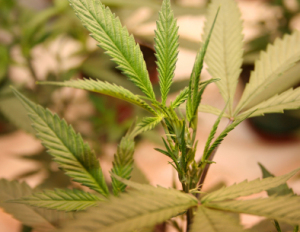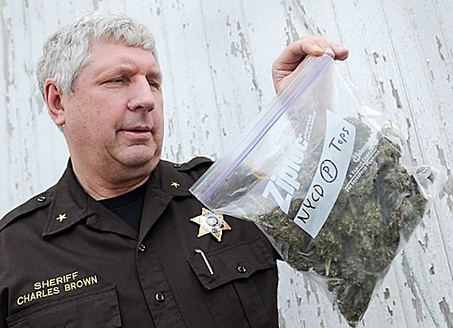After 18 years of resistance, law enforcement groups in California are showing signs they may be willing to work with the medical marijuana community to make MMJ work.
California voters approved medical marijuana in 1996 when they passed the Compassionate Use Act. The legislature implemented several aspects of the program in 2003, but MMJ has remained largely unregulated in California ever since.
 That’s mostly because of the lobbying efforts of police groups and the League of California Cities. Medical weed proponents have proposed many bills in the legislature to tighten the rules on the industry, but these groups have always opposed such legislation because they feel it would legitimize medicinal cannabis. And they’ve always succeeded.
That’s mostly because of the lobbying efforts of police groups and the League of California Cities. Medical weed proponents have proposed many bills in the legislature to tighten the rules on the industry, but these groups have always opposed such legislation because they feel it would legitimize medicinal cannabis. And they’ve always succeeded.
But now, rather suddenly, they’ve done an about-face. The League voted late in February to co-sponsor a bill in the Senate, SB 1262. Authored by Sen. Lou Correa, a Democrat from Santa Ana, the legislation focuses on both public safety and health-quality standards.
The bill wouldn’t make everyone happy, especially marijuana advocates – it would enshrine the right of local governments to ban dispensaries, for example. Those in the MMJ community favor another approach, AB 604 in the state Assembly.
That bill would encode the state Attorney General’s medical marijuana guidelines into law. State Assemblyman Tom Ammiano, a Democrat from San Francisco, has tried to pass AB 604 for years with no success, mostly because the police lobby keeps killing it. He plans to try again in 2014.
Still, cannabis activists are pleasantly surprised to see the change in policy from their longtime legislative opponents. Don Duncan, director of California-based Americans for Safe Access, said he was “happy to see they’re coming to the table.”
Ammiano released a statement saying he was pleased the League and law enforcement lobbies were “finally waking up to the reality of medical marijuana,” but that their bill was flawed as a result of “hiding their heads in the sand for years.”
Opposition to MMJ regulation stems largely from a philosophy, especially on the part of law enforcement, that weed has no medical benefits, regardless of scientific evidence to the contrary. Pot is viewed strictly as a dangerous illegal substance that must be destroyed to save our children. The Compassionate Use Act is seen as an illegitimate law with no force.
regardless of scientific evidence to the contrary. Pot is viewed strictly as a dangerous illegal substance that must be destroyed to save our children. The Compassionate Use Act is seen as an illegitimate law with no force.
Why that may be changing now is unclear. The training guide of the California Narcotic Officers Association, the single most powerful opponent of MMJ in the state, still declares “this ‘medical marijuana thing’ an epidemic that is infecting our society.”
The most likely explanation, though, may be simple realism. Public attitudes toward weed have changed dramatically over the years, in California as in the rest of the country. A solid majority now favors legal recreational pot, while police and municipal officials find themselves in an ever-shrinking minority opposed to medical cannabis.
And legalization may be just around the corner. Efforts to make the drug legal have failed for this year, but a more concerted campaign is already underway for 2016 – and it is expected to succeed. With the specter of recreational pot shops doing business across the state, opponents may now be happy to take what they can get.
 California Marijuana Market Breaking "Marijuana News" from CA
California Marijuana Market Breaking "Marijuana News" from CA





